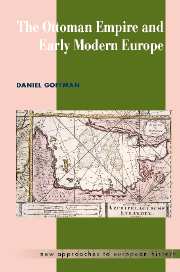Book contents
- Frontmatter
- Contents
- List of illustrations
- List of maps
- Preface
- Acknowledgements
- Note on usage
- Chronological table of events
- The Ottoman House through 1687
- 1 Introduction: Ottomancentrism and the West
- Part 1 State and society in the Ottoman world
- Kubad's formative years
- 2 Fabricating the Ottoman state
- Kubad in Istanbul
- 3 A seasoned polity
- Kubad at the Sublime Porte
- 4 Factionalism and insurrection
- Part 2 The Ottoman Empire in the Mediterranean and European worlds
- Glossary
- Suggestions for further reading
- Index
- NEW APPROACHES TO EUROPEAN HISTORY
Kubad's formative years
from Part 1 - State and society in the Ottoman world
Published online by Cambridge University Press: 05 June 2012
- Frontmatter
- Contents
- List of illustrations
- List of maps
- Preface
- Acknowledgements
- Note on usage
- Chronological table of events
- The Ottoman House through 1687
- 1 Introduction: Ottomancentrism and the West
- Part 1 State and society in the Ottoman world
- Kubad's formative years
- 2 Fabricating the Ottoman state
- Kubad in Istanbul
- 3 A seasoned polity
- Kubad at the Sublime Porte
- 4 Factionalism and insurrection
- Part 2 The Ottoman Empire in the Mediterranean and European worlds
- Glossary
- Suggestions for further reading
- Index
- NEW APPROACHES TO EUROPEAN HISTORY
Summary
Even the infidel comes to the fold of the faithful, but not the heretic dervish; the infidel has receptivity but not him.
He is out of the sphere of hope while the infidel is in the circle of fear of God,
By God, the infidel is far superior to him.
The young boy Kubad had no memory of his mother. He had only heard tales and rumors: that she was a prostitute, a gypsy, a Tatar princess, and, most extraordinary of all, that she had been a favorite of İbrahim Pasha, Sultan Süleyman's powerful if ill-fated grand vizier who led Ottoman armies and conquered Baghdad in 1634, only to be executed two years later by sultanic decree.
Not that it really mattered to Kubad. The only mother he had ever known – his “milk mother” – was the daughter of a venerated Shaykh of the Haydari order of dervishes. The boy spent his first years near the Ottoman frontier town of Erzincan, in a rustic hamlet next to the tekke, or house of worship, of this Shaykh. One of his earliest memories was of an elder reciting the strange words inscribed on the door of this tekke: “he who wants to enter our religion should live as we do, and preserve his chastity.” Kubad was so familiar with those who did join this devout order, that he thought nothing of their appearance.
- Type
- Chapter
- Information
- The Ottoman Empire and Early Modern Europe , pp. 23 - 26Publisher: Cambridge University PressPrint publication year: 2002

